Perhaps one of the least visible, yet most important contributions to civil society that the Church in America offers are “restorative justice” services in prisons. This sector of society—the incarcerated—is especially vulnerable to potential outbreaks of COVID-19.
Amid so much talk in our country about our broken prison system, Catholic Extension Society has regular insight and access to those who are actually making a difference.
Last decade, Catholic Extension Society provided funds to 46 dioceses to support their prison ministries, detention center outreach, post-incarceration programs and the like. Although often hidden to the outside world, these ministries are helping inmates make important internal transformations, that serve to reform, restore, or prepare them to re-enter society.
Take a look at how some of these ministries are adapting to new needs and restrictions:
Bismarck, North Dakota
Sr. Kathleen Atkinson, a Benedictine sister serving in Bismarck, ND, has reported that early releases were granted to many prisoners, to reduce the prison population.
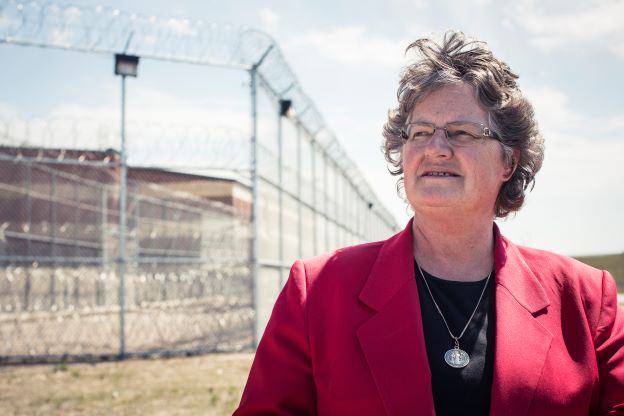
But unfortunately, shelters and halfway houses were also closed, meaning that prisoners were released only to end up homeless on the street. Therefore, the organization she directs, Ministry on the Margins, has made a commitment to housing people in a motel and trying to provide options for them such as bus ticket home.
“From April 1 to 15, we provided 298 nights of shelter… mostly people transitioning from incarceration,” she said.
She is also writing weekly “epistles” of prayer and encouragement to inmates.
Crookston, Minnesota
Among the prison ministers in Catholic Extension Society’s network is Kim Pitcher of the Diocese of Crookston, Minnesota.
“I miss going into the jail,” she said.
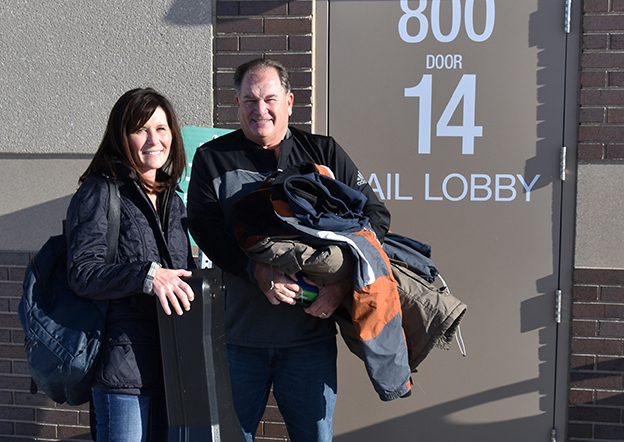
Recently, she wrote an article reflecting the transformation of an ex-felon, whom she befriended as she was serving a 10-year sentence. Pitcher concluded, “Yes, she had fallen, she became a felon, and she came out as a true Disciple of Christ. God has lit a fire in her that is so bright you are captivated and filled with peace and love when in her presence.”
Just before the COVID-19 outbreak, prison officials asked her to grow her ministry from just female inmates to male inmates. But, for now, those plans are on hold.
“I’m praying that we will get back into the jail to begin ministering again soon,” she said.
Tulsa, Oklahoma
Catholic Extension Society spoke with other prison chaplains this past week, who have also lost access to prisons amid regulations designed to prevent the spread of COVID-19.
Nonetheless, some chaplains are finding new ways to reach prison populations during this time of social distancing, even though they are banned from physically entering prisons.
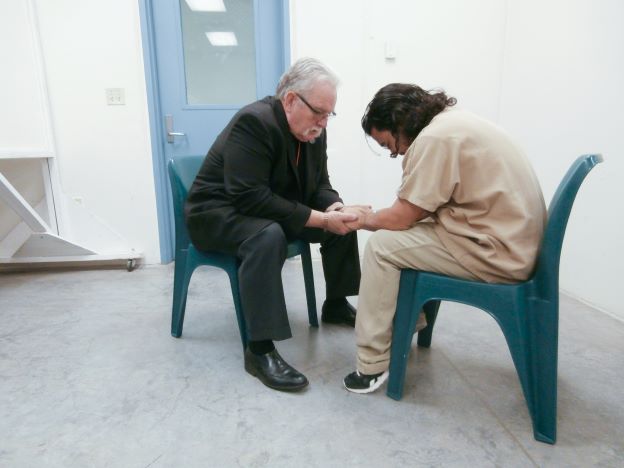
Deacon Kenny Longbrake, a seasoned chaplain in the Diocese of Tulsa, OK, said, “All the prison institutions in Oklahoma have been on total lockdown for five weeks now with no services of any kind being allowed in.”
However, he and his partners have been able to create a correspondence program, writing letters to inmates. They have also been able to supply religious articles and religious DVDs.
They are working with donors to procure personal hygiene products for indigent inmates, especially for women’s facilities.
“We are praying for those who are incarcerated,” he said. “With correctional officers coming and going it is very difficult for the inmates to stay isolated.”
Colorado Springs, Colorado
While many try to figure out how to help prisoners during the pandemic, Javier Cervantes from the Diocese of Colorado Springs is thinking about the potential long-term impact of the pandemic on prison ministry.
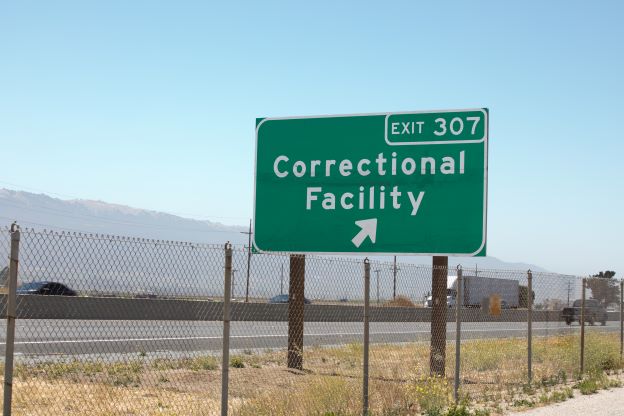
He reports that correctional facilities in his diocese have been on lockdown since mid-March. But, even when life goes back to normal, he is preparing for the fact that there may be stricter regulations in place for the foreseeable future which might impact detention ministries.
“I am planning to have a meeting with the Faith Programs Manager trying to have a sense of what can we expect once the lockdown is over,” he said. “I am assuming some changes are going to be needed.”
Shreveport, Louisiana
Inmates in northern Louisiana are staying connected with an authorized electronic messaging system. Van Sanders and the Diocese of Shreveport’s prison ministry are continuing to correspond with a group of 35 men who are studying the Gospels.
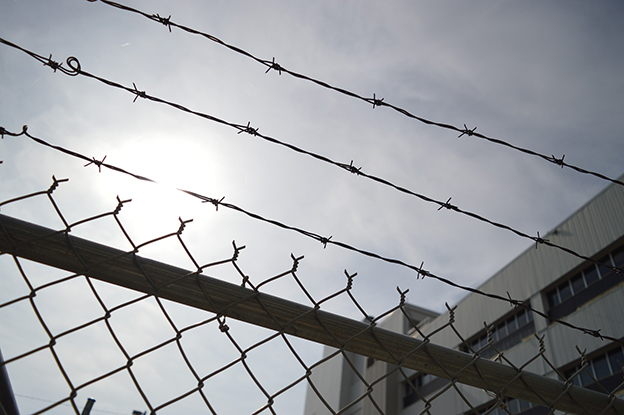
This ministry is also providing rosaries, Bibles, and the Catechism of the Catholic Church, and religious educational books and DVDs.
“Our team is looking forwarded to the day we can be back inside the walls with our brothers and sisters,” he said. “Following Pope Francis’s example, we continue to offer our prayers for our incarcerated brothers, sisters, and those on and outside the margins.”
Helena, Montana
In Montana, Warner Holm and the Diocese of Helena’s Prison “Discovery” group are hoping that their celebration of 50 years of ministry at the state prison will still take place in August. In the meantime, they are offering phone counseling for those in need.
“We look forward to the day when we can resume ministry!” he said.
Witnessing the beauty of bringing faith behind bars
There is worry about what more restrictions would mean for a population that is already so isolated socially. Although these programs go largely unseen by the public, their impact is life-changing and greatly needed.
At this time last year, a contingent from Catholic Extension Society was able to witness the beauty and impact of a prison chaplaincy program we support in the Diocese of Laredo, Texas.
Joe Boland, Cathoic Extension’s vice president of mission, shared this story:
“We were taken to a large federal detention facility. That day about 40 young men gathered for “chapel” services. As the group huddled in the windowless, cinderblock room, secured by a heavy steel door, the detainees were informed by the local bishop, James Tamayo, that Catholic Extension Society had arranged a special surprise for them.
“A group of about 30 missionary sisters, their compatriots from Latin America, were going to visit them. Suddenly the heavy door popped open and the sisters enveloped the room, breaking into song accompanied by rhythmic clapping.
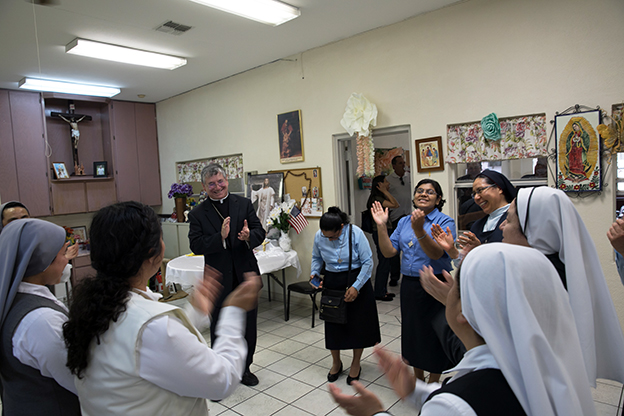
“In an instant, almost all of the young men were crying, stunned by this demonstration of beauty and music unfolding before them.
“One young man was seen with tears spilling off his cheeks onto his prison jumpsuit, holding out his hands heavenward, trying to savor the moment.
“Wherever those young men ended up, one has no doubt something indelible happened that day, when a group of singing sisters reassured them that they were loved and forever loveable.”
Catholic Extension Society continues to hope and pray that, when it is safe, the Church will continue to be able to do this important and transformative ministry among the millions of detained people in this country.
Faith communities need your help to continue their life-saving outreach. They cannot do it alone. Express solidarity with impoverished faith communities affected by COVID-19 by givingto our coronavirus response virtual collection basket, praying with and for us and inspiring others by sharing this story.



